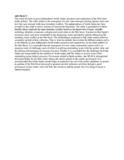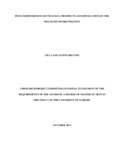| dc.contributor.author | Villa, Aduai Edward Lino | |
| dc.date.accessioned | 2013-11-15T08:37:14Z | |
| dc.date.available | 2013-11-15T08:37:14Z | |
| dc.date.issued | 2013-10 | |
| dc.identifier.citation | Degree of Master of Arts in diplomacy | en |
| dc.identifier.uri | http://erepository.uonbi.ac.ke:8080/xmlui/handle/123456789/59103 | |
| dc.description | A research project submitted in partial fulfillment of the requirements of the award of a degree of Master of Arts in diplomacy of the University of Nairobi. | en |
| dc.description.abstract | This study focused on post-independence South Sudan: prospects and implication of the Nile basin hydro-politics. The study relates to the emergence of a new state amongst existing riparian states and how this may resonate with trans-boundary conflicts. The independence of South Sudan has been revealed in this study to have a mixture of unanswered questions. The study is grounded on Collier-Hoeffer theory analysed the trans-boundary conflict based on the framework of many variable including: identities, economics, religion and social status in the Nile basin. It points out that Egypt’s economic status may have contributed to her hegemonic status and thereby greatly influencing the unending water conflict in the Nile basin. The methodology employed in this study mainly relied on secondary method of data collection. That is what has already been written by different authors and is in the libraries on post independent South Sudan prospects and implications on the hydro politics of the Nile Basin. It is concluded that the emergence of a new states customarily carries with it an immense array of challenges most of relate to resolving outstanding issues with the mother state, and the sharing and managing of common resources. Further, it is concluded that the challenges in South Sudan are compounded by the inability of South Sudan and The Sudan to resolve some of the outstanding issues before secession. For reasons related to hydro-politics, the SPLM/A relinquished all responsibility for the Nile waters during the interim period to the central government. It is recommended that South Sudan should begin to implement the call of the policy guidelines to protect its portion of the Nile River basin and to generate poverty reduction activities through a good governance system which views the Nile, the resources and the people who live along its basin as shared resources. | en |
| dc.language.iso | en | en |
| dc.publisher | University of Nairobi | en |
| dc.title | Post-independence south Sudan: prospects and implication on the Nile basin hydro-politics | en |
| dc.type | Thesis | en |
| local.publisher | Faculty of Arts | en |


